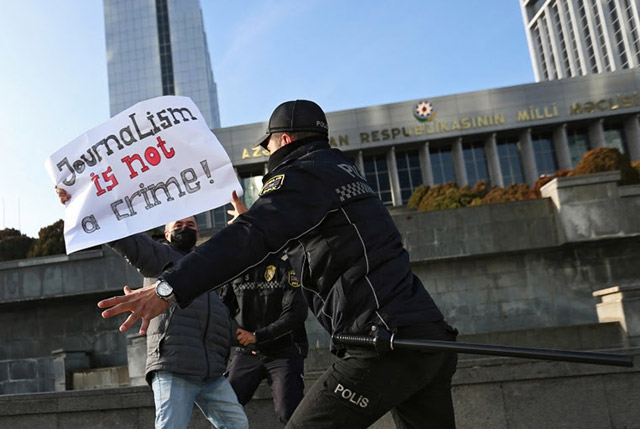Stockholm, February 10, 2022 – Azerbaijan authorities should repeal a newly enacted media law that increases state control of the press, the Committee to Protect Journalists said Thursday.
On Tuesday, February 8, President Ilham Aliyev enacted the law “On Media,” which replaces existing laws governing media outlets, according to news reports and a copy of the law, which CPJ reviewed.
The legislation requires the owners of media outlets to be Azerbaijani citizens permanently residing in the country if their outlets primarily cater to an audience in Azerbaijan. It also requires outlets’ owners and directors to be Azerbaijani citizens with a higher education degree.
If an outlet is found to accept foreign funding or employ a director who does not meet those requirements, it could be suspended for two months; if its owner does not meet the requirements, or if an outlet repeatedly violates other regulations, it can be shut down permanently.
Read also
Those restrictions apply to print, online, and broadcast outlets, as well as any individual or group that mainly publishes “audiovisual material” online. As CPJ has documented, many independent Azeri journalists work from exile and publish their work on social media, actions that could now be targeted under the new law.
“Azerbaijan’s new media law is riddled with ambiguities and onerous requirements, and appears deliberately calculated to target the last remaining bastions of free media covering the country,” said Gulnoza Said, CPJ’s Europe and Central Asia program coordinator, in New York. “President Ilham Aliyev never should have approved this law, and now authorities should work to repeal it and ensure it is never used against members of the press.”
Suspensions and shutdowns of print media, news agencies, and news websites will be decided by Azerbaijan’s courts, and a new seven-member Audiovisual Council, appointed by the presidency, will oversee cases involving those who publish “audiovisual material” online. The law also replaces the term “media outlet” with “media subject,” thereby allowing authorities to target individuals in addition to corporate media entities.
State-owned media and Natig Mammadli, department director at the state’s Media Development Agency which oversaw the law, have denied that “On Media” increases any restrictions for the press, saying it aims to modernize media legislation and improve journalists’ professionalism.
According to a presidential decree accompanying the new law, authorities are also developing separate penalties, ranging from fines to short periods of detention, suspensions, and shutdowns, for outlets that do not publish an “objective presentation of events,” feature swearing or disrespect of state symbols, or which spread superstitions, among other infractions. The decree states that those new penalties will be established within two months.
The law also establishes a state-maintained register of media outlets and journalists, and a government-issued press card. To be included in the register, journalists must have a higher education degree, at least three years’ experience, and a work contract, thereby excluding freelancers. Only registered journalists will be able to obtain the new press card, which allows them to obtain accreditation with government bodies and attend government events.
The law also states that news websites can be removed from the register if they do not publish at least 20 news items per day, and could be shut down if they do not increase their output.
In an interview with the BBC’s Azerbaijani service, Mammadli insisted that the sole purpose of the register was to gather statistical data, and that journalists and outlets not included in the register would be free to continue their work.
The new law was prepared by the Media Development Agency without the participation of independent media representatives, and was made publicly available the day before it was presented to parliament in mid-December 2021, according to a statement by dozens of representatives of independent media groups and media lawyer Alasgar Mammadli, one of the statement’s signatories, who spoke to CPJ in a video interview.
Mammadli said that members of parliament adopted only two of more than 40 amendments proposed by himself and other independent representatives during brief consultations before the law was passed on December 30.
Mehman Aliyev, director of the independent Turan news agency, who was among those consulted by parliament during the law’s passage, told CPJ by phone that authorities have not explained which types of outlet and individuals will fall under the new designations in the law.
He added that officials with the Media Development Agency gave him verbal assurances that press cards produced by media outlets themselves will still be accepted by authorities, but said that assurance was not included in the text of the law.
Authorities already often deny accreditations to independent outlets and bar their access to official sources, Aliyev said, adding that he believed the register would be used to “cut off” independent outlets and “restrict journalism as far as possible to their [state and pro-government] media.”
CPJ emailed the Media Development Agency, the parliament, and the office of the Azerbaijani presidency for comment, but did not receive any replies.
Committee to Protect Journalists




















































